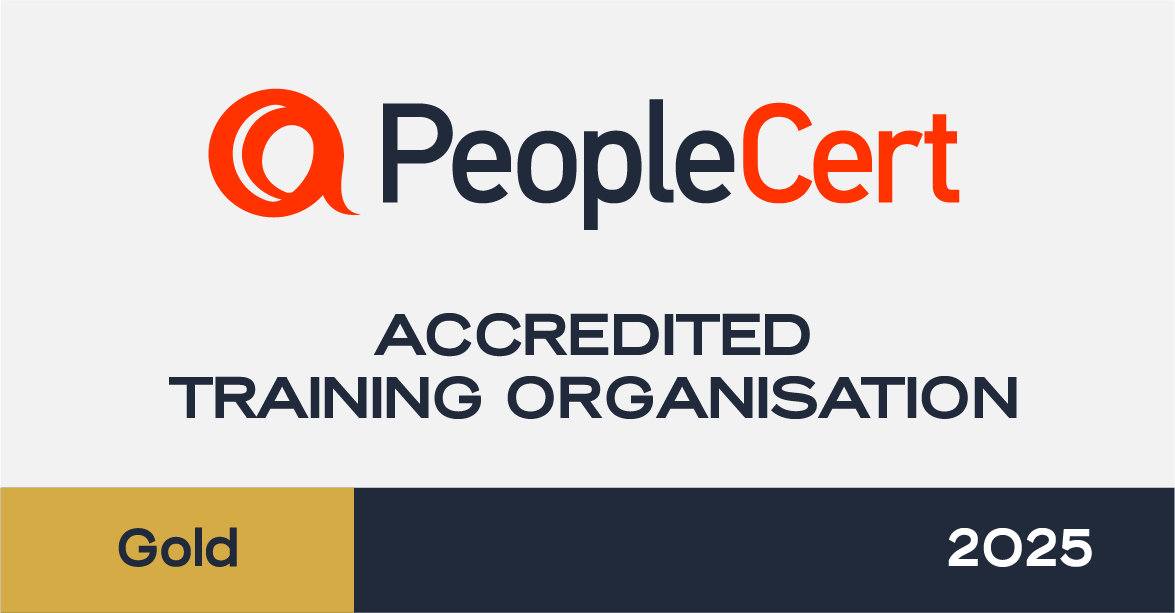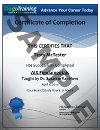Module 00: Course Introduction: ITIL® 2011: Foundation
Module 01: Exam Tips
- Understanding the exam process
- Exam questions and grading
- Taking the exam
- Using the practice exams
Module 02: Introduction to the Service Lifecycle
- What is ITIL®?
- ITIL Logistics
- The Service Lifecycle
- Lifecycle Phases
Module 03: Service Management as a Practice
- Where is IT now?
- What is a service?
- What is Service Management?
- All about Value
Module 04: Service Management as a Practice Part 2
- Key Elements
- 4 Ps of Service Design
- ITSM Roles
- Governance
- Supporting ITSM Frameworks
- ISO/IEC 20000
Module 05: Key Principles, Models and Concepts Part 1
- What is a process?
- Process Characteristics
- Functions
Module 06: Key Principles, Models and Concepts Part 2
- ITSM Roles
- Process Owner
- Process Manager
- Process Practitioner
- Service Owner
- RACI diagrams
Module 07: Key Principles, Models and Concepts Part 3
- Risk
- Business Case
- Communication
- Service Portfolio Components
- Pipeline
- Catalog
- Retired Services
- Prioritization
Module 08: Lifecycle Phases Part 1
- Service Strategy (SS)
- Overview (Purpose, Processes, Scope, Key Concepts)
- Value Creation
- Value to the Business
Module 09: Lifecycle Phases Part 2
- Service Design (SD)
- Overview (Purpose, Processes, Scope, Key Concepts)
- Five Aspects of Service Design
- Service Design Package (SDP)
- Value to the Business
Module 10: Lifecycle Phases Part 3
- Service Transition (ST)
- Overview (Purpose, Processes, Scope, Key Concepts)
- Service Knowledge Management System (SKMS)
- Value to the Business
Module 11: Lifecycle Phases Part 4
- Service Operation (SO)
- Overview (Purpose, Processes, Scope, Key Concepts)
- Value to the Business
Module 12: Lifecycle Phases Part 5
- Continual Service Improvement (CSI)
- Overview (Purpose, Processes, Scope, Key Concepts)
- Measures and Metrics
- CSI Register
- Improvement Models
- Value to the Business
- How the phases fit together
Module 13: Lifecycle Processes Part 1
- What you need to know from Service Strategy
- Service Portfolio Management (SPM)
- Portfolio, Pipeline, Catalog, Retired Services
- Financial Management (FM)
- Budgeting, Accounting and Charging
- Relationship to SLM
- Business Relationship Management (BRM)
Module 14: Lifecycle Processes Part 2
- What you need to know from Service Design
- Design Coordination (DC)
- Service Catalog Management (SCatM)
- 2- and 3-view Catalog
Module 15: Lifecycle Processes Part 3
- Service Level Management (SLM)
- Purpose, Objective, Scope, Value to the Business
- Key Concepts, Process Activities
- Service Level Agreement (SLA)
- Operational Level Agreement (OLA)
- Relationship to BRM
- Interfaces
Module 16: Lifecycle Processes Part 4
- Availability Management (AM)
- AARMSS, AMIS, Availability Plan
- Capacity Management (CapM)
- Business Capacity Management, Service Capacity Management, Component Capacity Management
- CMIS, Capacity Plan
Module 17: Lifecycle Processes Part 5
- IT Service Continuity Management (ITSCM)
- Business Impact Analysis (BIA)
- Information Security Management (ISM)
- Confidentiality, Integrity, Availability (CIA)
- ISMS, SMIS
- Supplier and Contract Management Information System (SCMIS)
- Supplier Categorization
- Supplier Management
Module 18: Lifecycle Processes Part 6
- What you need to know from Service Transition
- Transition Planning and Support (TPS)
- Service Asset and Configuration Management (SACM)
- Configuration Management System (CMS)
- Definitive Media Library (DML)
Module 19: Lifecycle Processes Part 7
- Change Management (ChM)
- Purpose, Objective, Scope, Value to the Business
- Key Concepts, Process Activities
- Types of Change
- Request for Change (RFC)
- Change Advisory Board (CAB)
- Interfaces
Module 20: Lifecycle Processes Part 8
- Release and Deployment Management (RDM)
- Phases of a Release
- Knowledge Management (KM)
- SKMS
Module 21: Lifecycle Processes Part 9
- What you need to know from Service Operation
- Event Management (EM)
- Types of events
- Request Fulfillment (RF)
- Standard Changes
- Rights Management
- Access Management (AccM)
Module 22: Lifecycle Processes Part 10
- Incident Management (IM)
- Purpose, Objective, Scope, Value to the Business
- Key Concepts, Process Activities
- Definitions, Timescales, Major Incidents, Status Tracking
- Relationship to Problem Management
- Incident Models
- Interfaces
Module 23: Lifecycle Processes Part 11
- Problem Management (PM)
- Purpose, Objective, Scope, Value to the Business
- Key Concepts, Process Activities
- Definitions, Timescales, Major Problems
- Relationship to Incident Management
- Problem Models
- Interfaces
Module 24: Lifecycle Processes Part 12
- What you need to know from CSI
- 7-Step Improvement Process (7S)
- The Steps
- Relationship to other Improvement Models
Module 25: Service Management Functions Part 1
- Overview of the Functions
- Service Desk
- Purpose
- Organizational Structures
Module 26: Service Management Functions Part 2
- Technical Management
- Role & Objectives
- IT Operational Management
- IT Operational Control
- Facilities Management
- Role and Objectives
- Application Management
- Relationship to Application Development



